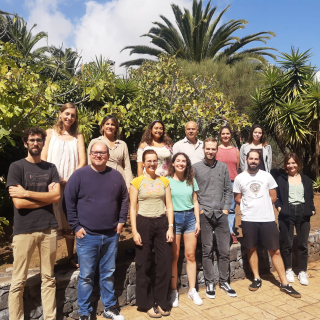Bibcode
López-Sanjuan, C.; Balcells, M.; Pérez-González, Pablo G.; Barro, Guillermo; García-Dabó, C. E.; Gallego, Jesús; Zamorano, Jaime
Referencia bibliográfica
The Astrophysical Journal, Volume 710, Issue 2, pp. 1170-1178 (2010).
Fecha de publicación:
2
2010
Revista
Número de citas
39
Número de citas referidas
36
Descripción
We study the evolution of galaxy structure since z ~ 1 to the present.
From a Great Observatories Origins Deep Survey South (GOODS-S)
multi-band catalog, we define (blue) luminosity- and mass-weighted
samples, limited by MB <= -20 and M sstarf
>= 1010 M sun, comprising 1122 and 987
galaxies, respectively. We extract early-type (ET; E/S0/Sa) and
late-type (LT; Sb-Irr) subsamples by their position in the
concentration-asymmetry plane, in which galaxies exhibit a clear
bimodality. We find that the ET fraction, f ET, rises with
cosmic time, with a corresponding decrease in the LT fraction, f
LT, in both luminosity- and mass-selected samples. However,
the evolution of the comoving number density is very different: the
decrease in the total number density of MB <= -20 galaxies
since z = 1 is due to the decrease in the LT population, which accounts
for ~75% of the total star formation rate in the range under study,
while the increase in the total number density of M sstarf
>= 1010 M sun galaxies in the same redshift
range is due to the evolution of ETs. This suggests that we need a
structural transformation between LT galaxies that form stars actively
and ET galaxies in which the stellar mass is located. Comparing the
observed evolution with the gas-rich major merger rate in GOODS-S, we
infer that only ~20% of the new ET galaxies with M sstarf
>= 1010 M sun appeared since z ~ 1 can be
explained by this kind of mergers, suggesting that minor mergers and
secular processes may be the driving mechanisms of the structural
evolution of intermediate-mass (M sstarf ~ 4 ×
1010 M sun) galaxies since z ~ 1.
Proyectos relacionados

Huellas de la Formación de las Galaxias: Poblaciones estelares, Dinámica y Morfología
Bienvenida a la página web del g rupo de investigación Traces of Galaxy Formation. Somos un grupo de investigación amplio, diverso y muy activo cuyo objetivo principal es entender la formación de galaxias en el Universo de una manera lo más completa posible. Con el estudio detellado de las poblaciones estelares como bandera, estamos constantemente
Ignacio
Martín Navarro